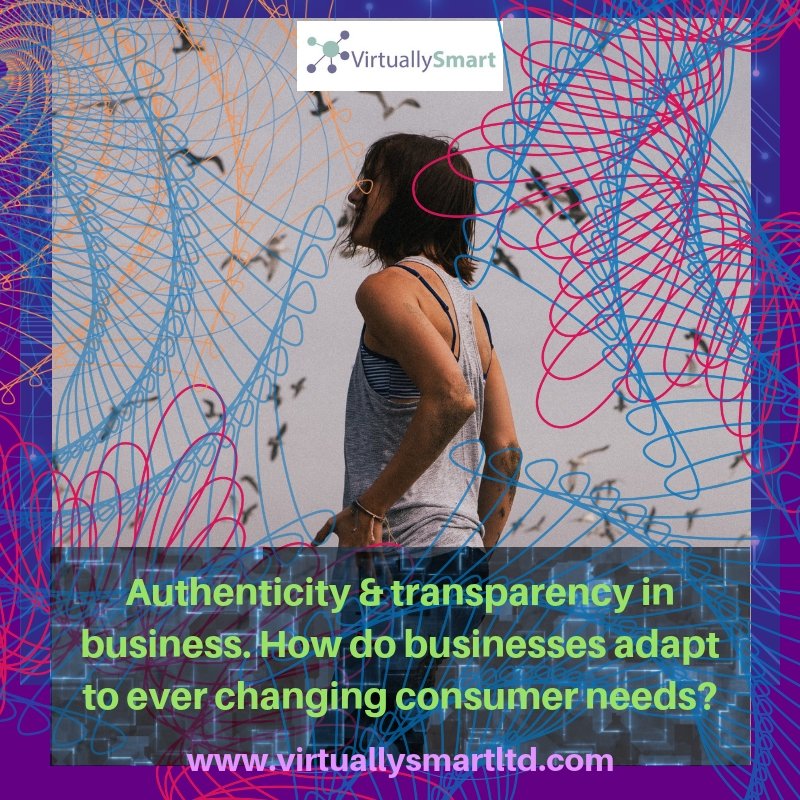The need for authenticity & the authentic nature of products/services, is an expectation more & more consumers are adopting.

Authenticity & transparency in business. How do businesses adapt to ever changing consumer needs?
Authenticity: the quality of being authentic.
The need for authenticity & the authentic nature of products/services, is an expectation more & more consumers are adopting. Understanding where products are made, the raw materials, the labour involved & the environmental impact, has become a driving consideration for the modern consumer.
Many teenagers these days, will actively research products, brands & services to be assured of their transparency & gain an understanding into their background & ethics. Therefore, with this in mind, companies are now becoming more & more aware of how they must attain to be transparent & authentic to appease & encourage the next generations of consumers.
The modern consumer.
The term ‘millenials’ is used continuously to describe the modern consumer. However, a long time before this generations savvy mindset & needs were recognised & before the digital age, consumers were able to experience the transparency of the businesses they were engaging with every day.
Post WWII for example, saw consumers purchasing their weekly food from the butcher, the baker, the green grocer. They knew where this produce came from, they could see it growing in the fields & a large proportion of them worked in these environments. Banks, Legal teams, Doctors, Mechanics, etc were all real people & the only way you could engage with them was by telephone or physical appointment & the only recommendations you would be privy to, were those of family, friends & others in your direct communities.
How times have changed. In as little as 70 years, the consumer & the business providers, have been transformed. No longer is the consumer limited to a handful of options, outlets or services. With the onslaught of the WWW, the consumer is now a global purchasing power with multiple layers of recommendations.
Social media & the internet
Social media & the internet has allowed companies to tap in to a global audience. From an advertising point of view, this strategy is a phenomenal money maker. However, recent research has found that:
“The Consumer Content Report: Influence in the Digital Age” by Stackla, finds that even in today’s consumerist and celebrity-centric culture, authenticity drives brand affinity. 86% of consumers said authenticity is important when deciding what brands they like and support.” Camilla Trinh
So where does this leave businesses? What must they do to appease the modern consumers ever changing needs?
Brands
Established brands have traditionally invested heavily to ensure they have a vast following, utilising branding powerhouse advertising to put them at the top. Younger consumers & millennials are now more conscious of what products & services are on offer, more aware that there is a vast choice & they can pick & choose at will. Furthermore, with entrepreneurial industries making waves through such social media apps as Instagram, Snapchat, YouTube, etc; the way businesses gain exposure & are exposed, is on a much more personal level, not hidden by layers of corporate cloaking.
“Authenticity: It makes your products come across as more authentic. This is especially important if you advertise the quality of your ingredients/raw materials.
Storytelling: It gives you a chance to share the story of how you came up with the product, its manufacturing process, etc.”
Jesse Ness, Ecwid Team
However, even with a substantial makeover, some long standing & established brands have started to fall by the way side & or are having to dramatically change their brand identities to continue to gain the attention of teenagers & millennials. In part this has to do with the accountability of their companies & that ALL staff, in the world of social media, represent the brand.
“…in an age of cellphones with cameras and live streaming to the internet, every employee of a company can potentially be held to account, even if their role is not public-facing.” Nikki Baird
An example of how a global brand can become damaged by it’s staffs actions, was the Oxfam Haiti scandal. Senior Oxfam employees were accused of paying earthquake survivors for sex in 2011.These allegations were very damaging to this international charity & sadly the ability for this information to go viral, could not be stopped as it was out in the public domain.
Accountability
With this in mind how can a brand retain it’s authenticity, when perhaps in their dim distant past lurks a scandal? or even a personal citation which could be damaging to a brand? Millenials are connected digitally & with the vast reaching arms of the internet within their reach, a simple google search could unearth something in contradiction to a brands public image, ethics & ethos. Furthermore, if a CEO or employee for example takes to social media with inappropriate content, it’s picked up & goes viral; the entire company then becomes accountable for this one action.
Transparency
Therefore, the need for transparency in business is growing. Consumers require more & more accountability for the products & services they are participating in. Companies are mindful of the need for transparency in terms of where their raw materials are sourced from, where they source their labour force & their employment policies. There is a greater expectation growing among millennials & younger consumers for accountability. Social media has the power to expose glitches & chinks in a companies armour, before their PR machines have even the time to blink.
Ultimately, consumers will become loyal to a company, brand or service as long as they feel they are participating in an authentic experience & businesses need to ensure they are developing these strategies & responding to modern cultural shifts. Gaining exposure & being open to change are the way modern businesses will need to adapt, strive & survive.
Written by Katy Jane on behalf of Virtually Smart Ltd.






